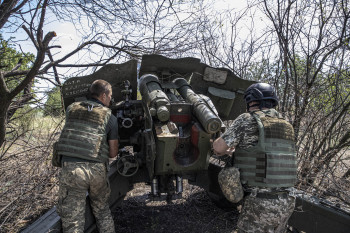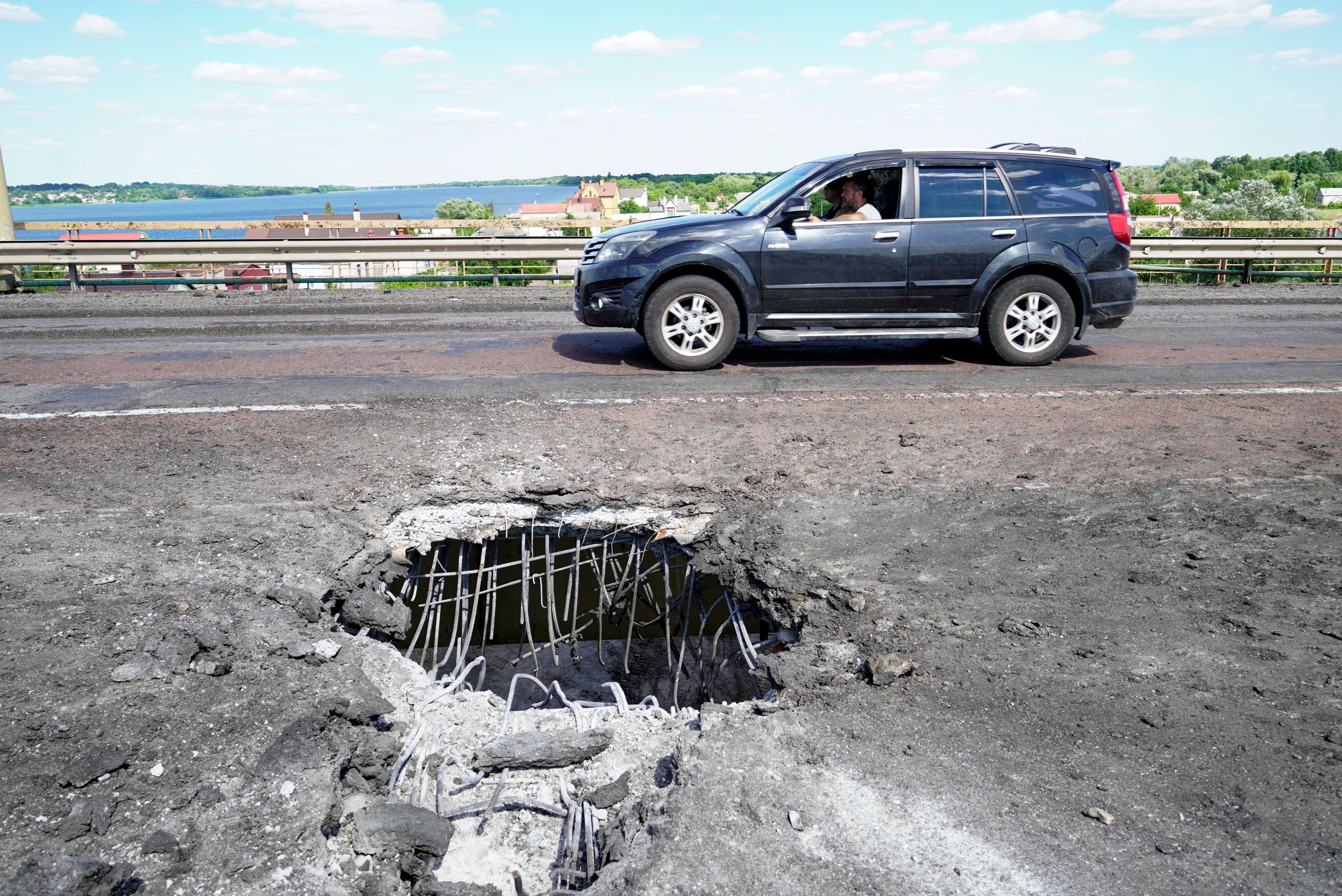The combat effectiveness of Russian forces in Ukraine’s southern Kherson Oblast will be noticeably affected by Ukrainian strikes on the bridges and crossing points there, military analysts said.
With multiple recent strikes against three main bridges across the Dnipro, Ukraine’s largest river, Russian forces in Kherson Oblast were forced to build pontoon bridges and use boats to transport equipment to their troops on the western side.
These have a lower transport capacity than bridges, while being just as vulnerable to the precise HIMARS rocket artillery systems used by Ukraine. That means less ammunition, fuel and rations for Russian forces west of the river.
“This doesn’t just slow down their operations, it also lowers the combat effectiveness of the troops,” Oleg Zhdanov, a Ukrainian reserve colonel and military expert, told the Kyiv Independent. “The amount of consumable material — ammunition, fuel and food is much more than what they can transport across the river to the other bank.”
The latest artillery attack on Aug. 25 struck the large Antonivsky Bridge across the Dnipro River, according to Ukraine’s Operational Command South spokeswoman Natalya Gumeniuk. The bridge has been under regular Ukrainian attack since July and while it still stands, it’s either barely usable or not usable at all.
Earlier this week, the bridge took some big hits from Ukrainian missiles on Aug. 22. According to Russian media, the attack killed two and injured 16 workers who were making repairs to the bridge.
There was unconfirmed information from Kherson city councilman Serhiy Khlan that the attack also took out a convoy of Russian ammunition-carrying trucks. Photos of a large explosion from the bridge caused some online speculation that it was a bigger blast than one a missile could cause on its own. But a Kherson Telegram channel posted locals’ reports that there didn’t seem to be vehicles on the bridge at the time of the explosions.
Another attack, this one against a dam bridge near Nova Kakhovka, was reported on the afternoon of Aug. 24. Kherson Telegram channels posted videos of loud explosions and black smoke rising from the direction of the dam. Khlan said that the attack managed to strike the bridge.
Open source information from residents appeared mixed, with at least one explaining that the bridge had been “f**ked in half” by the Ukrainian attacks and its usable days were over. Others reported that light vehicles can still cross. Gumeniuk said that moving heavy equipment across this bridge is now impossible.
The General Intelligence Directorate of Ukraine claimed that it intercepted a call between two Russian soldiers discussing the bridge, saying it was being used to transport the wounded, despite being filled with holes.

Regardless, the Institute for the Study of War (ISW), a D.C.-based think tank monitoring Russia’s war in Ukraine, said that Ukraine's disruption of the three main bridges in the area — if Ukraine can prevent them from being restored — means "Russian forces on the west bank of the Dnipro will likely lose the ability to defend themselves against even limited Ukrainian counterattacks."
Indicators of this, to become evident within a few weeks, should include fuel and ammo shortages, abandoned vehicles, and a decrease in the intensity of Russian assaults and artillery attacks. This will depend on the amount of supplies stockpiled on the west bank.
British intelligence reported that the Russians have begun building pontoon bridges over the weekend and are using boats to transport supplies across the river. Experts said this is a lot slower and more cumbersome than using a stationary bridge, on top of being an easy target.
“The capacity of a pontoon bridge is many times lower than that of a normal bridge,” Zhdanov said. “Plus, pontoon bridges have their own specific nuances. Heavy vehicles have to cross at certain intervals, at a certain speed. The Dnipro has a very strong flow and you can’t overload the bridge too much. If they work around the clock, they can maybe provide some supplies” to the troops on the Western side.
According to the ISW, while the Russians can offset the loss of Dnipro-spanning bridges in Kherson Oblast with barges and pontoon bridges, doing so makes them more vulnerable.
“The use of barges creates even more vulnerabilities for the Russians' supply lines. Not only are these uncovered barges themselves vulnerable to attack, the process of loading and unloading them efficiently requires massing bunches of fuel and ammunition on shore, and those loading areas make great targets,” the Institute wrote to the Kyiv Independent.
“The alternative process of loading smaller amounts of supplies will take longer and gives the Ukrainians ample opportunity to hit the barge when it's nearly full.”
It takes fewer hits to disable a pontoon bridge, compared to a stationary one, especially in strong currents.
However, Ukrainian military analyst Kostiantyn Mashovets cautioned against premature celebration, saying Russians still have the capacity to resupply and move troops and equipment across the river.
____________________
Note from the author:
Hi, this is Igor Kossov, I hope you enjoyed reading my article.
I consider it a privilege to keep you informed about one of this century's greatest tragedies, Russia's ongoing invasion of Ukraine. With the help of my colleagues, I will continue to bring you in-depth insights into Ukraine's war effort, its international impacts, and the economic, social, and human cost of this war. But I cannot do it without your help. To support independent Ukrainian journalists, consider donating to the Kyiv Independent and becoming our patron. Thank you very much.













